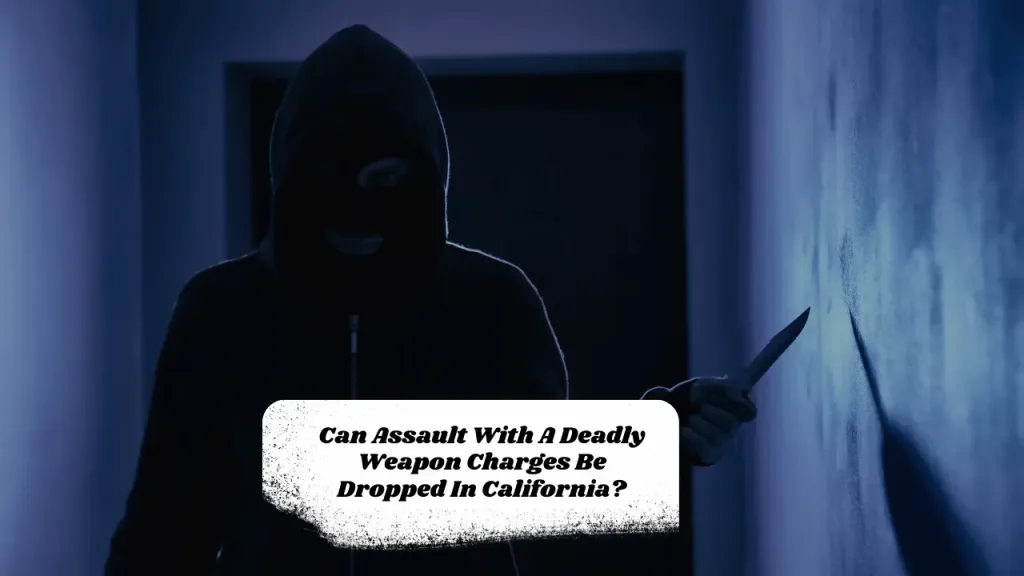Can Assault With A Deadly Weapon Charges Be Dropped In California?
Yes, charges for assault with a deadly weapon (ADW) can potentially be dropped in California. But, it depends on several factors, including the specific circumstances of the case, the evidence available, and the decisions of both the prosecutor and the alleged victim. Here’s a breakdown of how this might happen:
Table of Contents
1. Lack of Evidence
For a conviction, the prosecution must prove the elements of the charge beyond a reasonable doubt, including:
- The defendant committed an assault.
- A deadly weapon or force likely to cause great bodily injury was used.
- The act was willful.
If the evidence is insufficient—such as unreliable witness testimony, lack of a weapon, or no evidence of intent—the prosecutor may drop or reduce the charges.
2. Victim’s Cooperation
The alleged victim’s willingness to cooperate can influence the case. If the victim refuses to testify or recants their statement, it can weaken the prosecution’s case. However, California prosecutors can still pursue charges based on other evidence, as ADW is considered a crime against the state.
3. Self-Defense or Defense of Others
If the defendant acted in self-defense or defense of others, they may have a legal justification for their actions. Demonstrating this could lead to the charges being dropped or dismissed.
Related articles for you:
Charlie Dixon Lawsuit Key Allegations and Details
4. Plea Bargaining
The defense and prosecution may agree to reduce or dismiss the ADW charge in exchange for a guilty plea to a lesser offense, such as simple assault or disturbing the peace. This often happens if the evidence doesn’t strongly support the ADW charge.
5. Diversion Programs
In certain cases, defendants may qualify for diversion programs, especially if they lack a prior criminal record. Successful completion of a program could lead to the charges being dismissed.
6. Procedural Issues
If law enforcement violated the defendant’s constitutional rights—such as conducting an unlawful search or failing to read Miranda rights—the defense could argue for evidence to be excluded, weakening the prosecution’s case and possibly resulting in dropped charges.
Related article: Is Verbal Assault Actually A Crime?

What to Do if Facing ADW Charges?
- Hire an experienced attorney: A skilled criminal defense lawyer can evaluate your case, identify weaknesses in the prosecution’s evidence, and negotiate with the prosecutor.
- Gather evidence: Collect any evidence that supports your defense, such as video footage, witness statements, or medical records.
- Understand your options: Your lawyer can guide you through plea deals, diversion programs, or taking the case to trial.
If you’d like specific legal advice, consult a California criminal defense attorney who can provide tailored guidance based on your case details.
FAQs
What qualifies as a “deadly weapon” in an ADW charge?
A “deadly weapon” includes any object capable of causing significant bodily injury or death. This can range from firearms and knives to items like bats, cars, or even objects not typically considered weapons, depending on how they are used.
Can ADW charges be dropped if the victim doesn’t press charges?
While a victim’s unwillingness to cooperate may weaken the case, ADW is considered a crime against the state, and the prosecution can still proceed if there is enough evidence, such as witness testimony or video footage.
What are the penalties for ADW in California?
ADW can be charged as a misdemeanor or a felony, depending on the circumstances.
- Misdemeanor ADW: Up to 1 year in county jail and/or a fine of up to $1,000.
- Felony ADW: 2-4 years in state prison and fines up to $10,000.
The sentence may be harsher if a firearm was used or the victim suffered significant injury.
Can a first-time offender get their charges reduced or dismissed?
Yes, first-time offenders may have a better chance of negotiating reduced charges, entering a diversion program, or even having charges dropped, especially if there are mitigating circumstances or insufficient evidence.
How does intent factor into ADW charges?
Prosecutors must prove that the defendant acted willfully and with intent to commit an assault. If intent cannot be established, it may lead to reduced charges or dismissal.
Can self-defense be used as a defense for ADW charges?
Yes. If the defendant can prove they acted in self-defense or in defense of others, they may avoid conviction. The use of force must have been proportionate to the threat faced.
What role does a plea bargain play in ADW cases?
A plea bargain may involve pleading guilty to a lesser charge, such as simple assault, in exchange for reduced penalties. This is often negotiated when the prosecution’s evidence is weak or the defendant has mitigating circumstances.
Are ADW charges eligible for expungement in California?
Misdemeanor ADW convictions can typically be expunged after completing probation. Felony convictions may also be expunged, provided the defendant did not serve time in state prison or qualifies under specific laws like California’s AB 1950 or Prop 47.
What is the difference between assault with a deadly weapon and battery?
- Assault with a deadly weapon: Involves the threat or attempt to harm someone with a deadly weapon.
- Battery: Involves actual physical contact that results in harm.
ADW does not require physical contact but rather the intention and ability to inflict harm.
Should I hire an attorney if facing ADW charges?
Absolutely. ADW charges carry serious consequences, including prison time and fines. An experienced criminal defense attorney can review the evidence, build a strong defense, and negotiate for reduced charges or dismissal.
About the Author

Sarah Klein, JD, is a former criminal defense attorney with hands-on experience in cases involving DUIs, petty theft, assault, and false accusations. Through All About Lawyer, she now helps readers understand their legal rights, the criminal justice process, and how to protect themselves when facing charges.
Read more about Sarah
